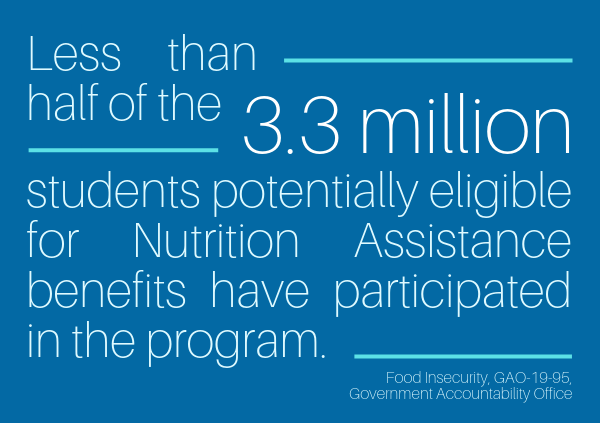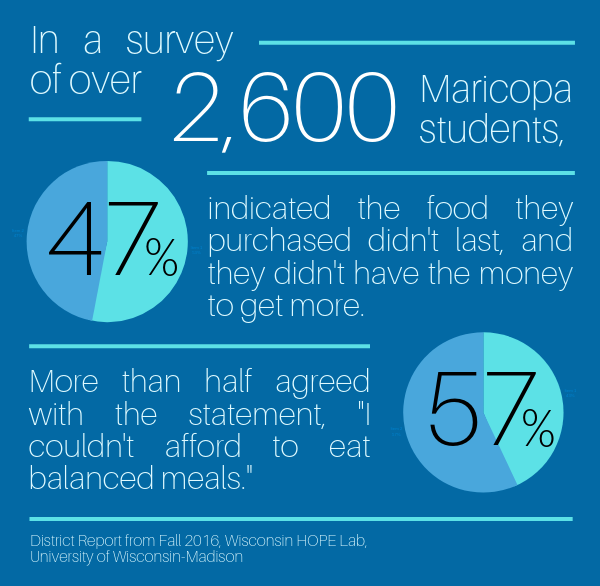DES and Community Colleges to Fight Food Insecurity Among Students
The college student living off of ramen noodles is a popular image, and as the cost of higher education continues to rise in the United States, this image is pervasive across college campuses. According to a report by the U.S. Government Accountability Office, millions of low-income college students are at-risk of food insecurity, often confronted with the decision to either receive an education, or continue to put food on their table.

No one should have to choose between achieving their dreams or meeting their basic needs. However, less than half of the 3.3 million students potentially eligible for Nutrition Assistance benefits have actually participated in the program. The Government Accountability Office says that students don’t realize they qualify for the program, or they don’t know how to navigate the system. There are also a number of students who are embarrassed to report they are struggling.
Many college campuses provide free food to students through on-campus food pantries and emergency funds, but monthly assistance can provide a level of stability necessary to succeed in the academic world.
Helping Arizona Students Apply for Nutrition Assistance

Students in Arizona are facing similar issues. In a survey of over 2,600 Maricopa students, 47% indicated that the food they purchased didn’t last, and they didn’t have the money to get more, and 57% answered affirmatively to the statement, “I couldn’t afford to eat balanced meals.”
The DES Office of Community Engagement has been working closely with the Maricopa Community Colleges to help connect students to the resources available to them. DES will train college staff to assist students with the application process for Nutrition Assistance, in addition to other DES programs like Medical Assistance and Cash Assistance.
Staff will be able to assist students to input data and upload documents. The schools will also provide phone banks for students to call DES to conduct their eligibility interview without having to visit a local office or use their own cell phone minutes.
Additionally, DES eligibility workers were on campus at Gateway, Phoenix, Mesa and Glendale Community Colleges August 12-15 and August 19-22, 2019, to serve student applicants through a DES program called Project Connect, which places DES employees with community organizations like homeless shelters and nonprofit services.
Which students are eligible for Nutrition Assistance?
Although most able-bodied students enrolled in higher education at least half-time are not eligible for Nutrition Assistance, there are several circumstances that may make a student eligible, including:
- Working at least 20 hours a week
- Participating in a state or federally financed work-study program
- Taking care of a dependent household member under the age of 6, or taking care of a dependent between 6 and 12 without adequate child care to allow them to attend school and work a minimum of 20 hours
- Taking care of a dependent under 12 while enrolled full-time in college, when otherwise eligible
- Receiving assistance through Title IV-A of the Social Security Act (Cash Assistance through Temporary Assistance for Needy Families)
- Being assigned or placed into higher education through the Workforce Innovation and Opportunity Act, Section 236 of the Trade Act, the Supplemental Nutrition Assistance Employment and Training Program, or another employment and training program administered by a state or local government
Student restrictions do not apply to those attending college less than half-time (as defined by the school).
How do you apply for Nutrition Assistance?
There are several ways to apply for Nutrition Assistance, including online, by mail, by fax, or in-person at your local DES office. The following video will provide you with tips to best navigate the system.

